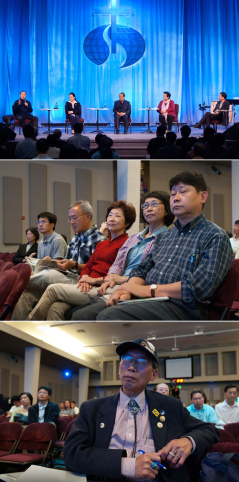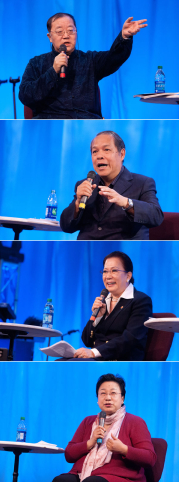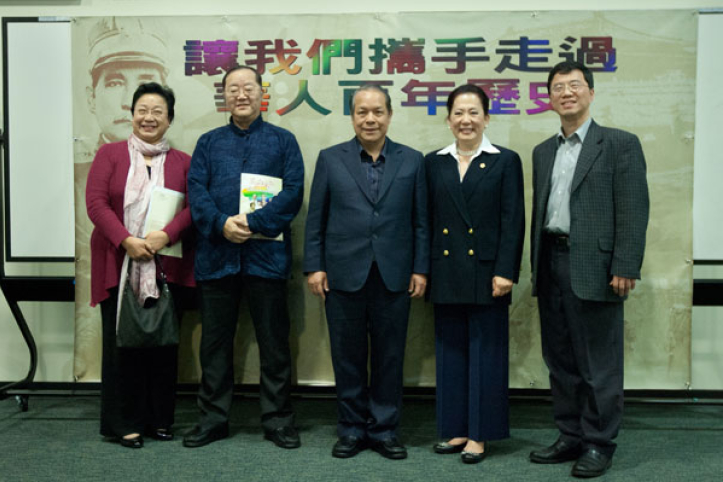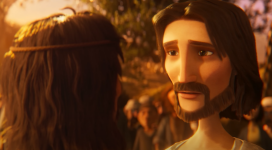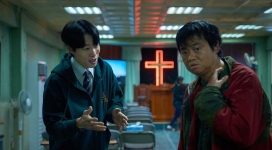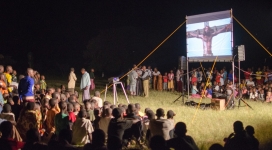The three-day long "Dr. Sun Yat-sen and the one hundred years of Xinhai history" exhibition organized by the Cosmic Light Holistic Care Agencies in the Bay area came to an end on the 13th. The forum held in the afternoon themed "Reflecting on the hundred years and looking into the future" focused on historical leaders of the previous century and how they influenced the era under the influence of Christianity.
The four speakers on the forum included Professor Lin Zhiping (the Director General of Cosmic Light), Wei Linen (Executive Secretary of the Cosmic Light Morrison Memorial Institute), Song Cao Lixuan (the Song family of daughters-in-law history record keeper), and Kuo Tai-chun (a researcher form the Hoover Institute of Stanford University).
Recovering broken historic pieces from Chinese modern history to the history of Christianity
Professor Lin Zhiping is amongst the earliest pioneers to study the history of Christianity in China. He shared how he became an expert in history of Christianity from being just an ordinary professor of Chinese modern history. In the past, students in Taiwan have been taught that "Christianity is the leader of monarchy", and Professor Lin was no exception. In high school, he felt that life was like an emptiness that could not be filled. He thus determined to believe in God in an evangelistic meeting, and gradually experienced the bittersweet of God's love. Since then, he studied politics and diplomatic topics in university, and when he touched on historic topics such as the Opium War, the Treaty of Beijing, the invasion of China by the Eight-Power Allied Forces, he felt very conflicted.
When he was teaching in Chung Yuan Christian University, Professor Lin often invited students to share religion at home. However, the students seemed to prefer attending his classes and lectures, and were not very enthused about discussing religion at home. Professor Lin realized that he must help students breakthrough and spread the Gospel in a scholarly manner. During one prayer, he was inspired by a scripture "And who knows but that you have come to your royal position for such a time as this?" (Esther 4:14) He understood that God gave him the position to teach in the university in order to fulfill His will somehow.
Studying the history of Christianity in an academic environment during that time was dangerous, and Professor Lin joked that it was "dangerous study", because the academic environment was full of voices against Christianity. Nevertheless, he started the pursuit of research in this area because he was deeply touched, and his heart is filled with gratitude up to this day, when the topics of research surrounding Christianity and China have become popular locally and internationally.
Professor Lin said that when he first started his research, he noticed that the life and experiences of Dr. Sun Yat-sen were closely related to Christians and Christianity. Dr. Sun Yat-sen also vowed and set up the "China Youth Party" with friends in the revolution (Lu Hao-tung and Song Yao-ru) in 1894 based on the Bible, and his ways later became part of the swearing-in ceremony of the "China Revival Party".
Following the failure of the uprising in Guangzhou, Dr. Sun Yat-sen fleed to Japan, America, and England. In 1896, when Dr. Sun Yat-sen journeyed to London, England, he was captured and placed under house arrest by the Qing embassy. Fortunately, a Christian servant named Cole helped him send out letters of distress, leading to his rescue and escape later aided by Kang De-li (a teacher in the College of Western Medicine) and Meng Cheng.
In a letter written to Ou Fung-chee, Dr. Sun Yat-sen stated, “……without hope in living, without the luxury of crying to the sky when in poverty, or crying to the parents when in pain, I could only humble myself in repentance and pray with a contrite heart to God, for six or seven days and nights, without rest. The more I prayed, the more sincere I got, and on the seventh day I felt comforted, without signs of worry, when I could take it easy. I told myself that God had blessed me by prayers……that God had received my prayers, had comforted me, and had touched those who were willing to spread this message for me ……this big ordeal, to me, had been like the returning home of a prodigal son, the rescue of a lost sheep, and this is the great blessing from the Father ……” From this, the exile to London event was a big influence on Dr. Sun Yat-sen’s spiritual life. However, these life events were largely not known in the usual public records.
Reading the journal of Chiang Kai-shek to understand the historic truth
Song Cao Lixuan is a community service worker, missionary, and the daughter-in-law of the brother of Song Mei-ling (Song Tzi-an). In 2003, when Song Mei-ling passed away, Song Cao Lixuan began filtering and sorting the records of the Song family at the Stanford University Hoover Institute. She then took on the task of sorting the records of the Chiang family and the Hong family. Song Cao Lixuan said that she gained much understanding through these records in the motives, thoughts, and strategies in those involved, and she was especially shaken when reading the journal of Chiang Kai-shek. His journal recorded daily spiritual meditations and prayers. Especially after he had retreated to Taiwan, he was weeping in front of God daily in his journals.
The Stanford University Hoover Institute researcher Kuo Tai-chun interpreted the journal of Chiang Kai-shek at great lengths. She said that she knew Chiang Kai-shek as a leader, politician, and military personnel, but she knew him from a different light through his journals. Many people thought that Chiang Kai-shek was a fake Christian, and only entered Christianity because he wanted to marry Song Mei-ling. However, she would no longer think that way after reading the journal of Chiang Kai-shek. Kuo Tai-chun then quoted several examples.
According to Chiang’s journal, during the period of war against Japan, the “Bible” and “Streams in the Desert” were Chiang’s spiritual support. Before the Wuhan battle (October 2, 1938), Chiang wrote: “The setting up is done, the manpower is exhausted, the time has come, when man has finalized this matter, that I can from now on fulfil God’s calling in quietness and simplicity.”
On October 16, 1938, he again wrote: “The landscape remains, the view is as ever, the situation of war and country is filled with much sadness and sorrow. I believe that God will bless the great China, and turn danger into safety.”
Up until the civil war broke out in China, at the time when the civilian army lost and retreated to Taiwan, Chiang’s heart experienced a sense of powerless for the first time. In many places within his journal, one can see that he had prayed sincerely and fervently for his country and his people’s future.
On October 11, 1949, the People’s Republic of China was established. He wrote as such: “Witnessing the danger of collapse of the hand-crafted country of China, how can one not push forward in tears? By travelling this path, one knows how hard it is going to be……there is darkness everywhere, seeing only defeat, the power of the devil is strong, so strong as if it cannot be blocked off, the environment is worse than ever, and God seems to be far from us and to have deserted us; but thanks to God I can still hold on to this thread of illumination and faith, which is enough for me to step forward and not lose hope and heart.”
The 31st of the same month was Chiang’s 63rd birthday. He admitted in his journal that “the past year was the darkest, saddest year in his life”, but his strength was not exhausted, and he kept praying for God’s mercy, to let him fulfil his calling of saving his country and his people during this lifetime. It was said in the journal: “Maybe God is merciful due to my sincerity, and my enthusiasm towards God, my country, and my people, and my endurance. Thus God has extended my lifespan, to wait for me save my country and my people, to protect God’s church so that His calling for me can be fulfilled.”
Kuo Tai-chun felt that Chiang’s most admirable quality is his unyielding spirit, and this spirit stemmed from his Christian belief and faith. At the most difficult times, as a leader, he could only rely on God to endure through these obstacles, and in the end brought his people to Taiwan to re-establish their land.
Thus, Kuo Tai-chun said that Chiang’s journal is very important, because people previously emphasized on judging a person on the surface, but only when you look into the heart of a person, can you understand the meaning of his decisions, and the historic truth.
The vast contributions of Chinese Christians in various professions
Wei Linen (Executive Secretary of the Cosmic Light Morrison Memorial Institute, retired speaker of the Chung Yuan Christian University, and researcher of the Chinese church history) then spoke of the contributions some Chinese Christians made in various professions in modern history. Recently, China’s Mo Yan-le received the Nobel literature prize, which is undoubtedly the pride of the Chinese. In fact, in 1943, there was a person listed amongst Einstein, etc, to receive the honor of “The 10 most revolutionary people of the modern world”. He was the “father of the world’s peasants’ education”, Y.C. James Yen.
Wei Linen introduced him as a peasant child who met a British missionary, James Stewart, through a Christian school. Y.C. was influenced by James Stewart to first go to Hong Kong to attend St. Paul’s College, and then subsequently to attend Yale University. While he was in Yale during World War I, Y.C. went to France to aid as a Chinese worker in the war, to write letters for the warriors. He then realized that through appropriate education, one could express their talents and potentials even as peasants. In 1920, Y.C., after receiving a Master degree from Princeton University, entered into the development of peasant education and living quarters, and carried out the famed “Experiment of Administrative Areas”.
In the 50s and 80s of the previous century, Y.C. publicized peasant education to Thailand, the Philippines, India, the Republic of Ghana, Columbia, Guatemala, etc., to benefit the people of many countries.
The four speakers went on to discuss how the famous Chinese obstetric pioneer Lin Kao-zhi, the famous Chinese pediatrician Hsu Han-guang, etc. steadfastly fulfilled the Christian belief, and excelled professionally in various regions. They unitedly believe that they have achieved a higher understanding of values, so that they are able to not succumb to obstacles, and to sacrifice themselves for the welfare of the people.
Finally, in the question and answer period, someone asked “what effect would a Christianized China have to China and the world?” Song Cao Lixuan said that a Christianized China would be similar to the early America, filled with equality and acceptance; Wei Linen said that the fear was not in Christianization, but in non-Christianization.
Professor Lin Zhiping emphasized in the end the concept of “all the people”, in hopes that China’s leader of the new generation who is to be established can re-examine his values, and think about how to treat the meaning and value of “mankind”.
[Editor's note: Carol Lee translated the article.]



